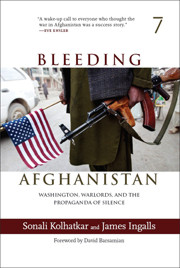The Guardian, January 2, 2008
Slaughter and Forgetting
Books like The Kite Runner, The Bookseller of Kabul and Reading Lolita in Tehran painstakingly recreate details of native culture and history, and yet conveniently omit a long history of US involvement and intervention.
By Lakshmi Chaudhry
Only the political amnesia of Hollywood films about the Muslim world lets them be hits in the west.
I bought The Kite Runner in the hope that it might provide some insights into Afghanistan, one of the many areas of the world about which much is said through the lens of the powerful, but little is seen of the actualities of the everyday lives of the people. What I read was anything but.
The author is an Americanised refugee after the Soviet invasion. The book reads like the most trite cowboy film, and avoids any issue that might conflict with the most simplistic Western view (in the political and film sense), and offers little real-life context.
The "bad guys" are the "Communists" and Taliban. Risibly the main bad guy is the school bully, a Hitler admirer, and a homosexual rapist who then becomes a Taliban leader. How many buttons does that push ...? Little, if any, mention is made of US involvement, the warlords or the mujaheddin.
Even the title and theme echoes the PR put out by the US in order to demonise the Taliban (... they've even banned kite flying ...) prior to invasion. What we get instead is a simplistic, back-and-white, sentimental cliche-ridden story, designed for the US market, that informs nothing.
'For all the pain and loss that The Kite Runner depicts, it is still a film of exhilarating, redemptive humanity, conveying an enduring sense of hope," gushed Ann Hornaday in her Washington Post review of the cinematic adaptation of Khaled Hosseini's literary blockbuster. While other movie critics were less enthusiastic, almost all emphasised the "universal" appeal of a story of childhood friendship, betrayal and atonement, set against the backdrop of three decades of recent Afghan history.
The release of The Kite Runner at the height of the holiday movie season no doubt showed a certain amount of chutzpah on the part of Hollywood, given its unfestive subject and cast of unknown Afghan and Iranian actors. Sadly, such marketing brio isn't matched by the movie itself, which is yet another dismal example of Hollywood's predilection for historical amnesia and political pandering, especially when it comes to stories about the Muslim world.
Published in 2003, the novel emerged as a literary dark horse that made its way to the top of the bestseller lists based almost entirely on word-of-mouth marketing by enthusiastic readers and book clubs. Critics and commentators widely praised Hosseini for "humanising" both Afghanistan and its people at a time when, in the wake of 9/11, they were more likely to evoke fear than empathy.
The "story", however, is more than a little suspect. Both the novel and its faithful cinematic adaptation rely on a carefully edited version of political reality that enables western - or, more specifically, American - empathy with the other by absolving the self of all responsibility.
It isn't a coincidence that at a time when most Americans feel tremendous anxiety and uncertainty about our relationship with the Muslim world, the publishing industry has witnessed a boom in Islam-themed books that shift the attention away from "us" to "them". Books like The Kite Runner, The Bookseller of Kabul and Reading Lolita in Tehran painstakingly recreate details of native culture and history, and yet conveniently omit a long history of US involvement and intervention.
 ( http://www.bleedingafghanistan.com )
( http://www.bleedingafghanistan.com )RAWA: For a realistic reflection of events in Afghanistan in the past three decades read:
"Bleeding Afghanistan:
Washington, Warlords, and the Propaganda of Silence"
By Sonali Kolhatkar and James Ingalls
But The Kite Runner's crimes against historical integrity pale in comparison with that other movie about Afghanistan to hit theatres this Christmas. Charlie Wilson's War manages to recast shortsighted hubris and rabid anti-communism as patriotic virtue. It makes a hero of the flamboyant Texan congressman who engineered a $1bn covert CIA operation to arm the mujahideen resistance to Soviet occupation back in the 1980s. This operation entailed, among other things, secretly funnelling arms and money from Israel to Pakistan without congressional oversight; getting in bed with Pakistani dictator Zia ul Haq, a man widely credited for transforming Pakistan into an Islamic state and building its nuclear arsenal; and last but not least, nurturing the very jihadis who would later become foot soldiers of al-Qaida.
Yet all this self-styled political satire has to offer by way of acknowledging that pesky little thing we call blowback is an ambiguous quote about how we "fucked up the endgame".
Maybe it's just good old-fashioned denial, both of history and of our role in shaping it. While its big-screen adaptation is unlikely to do as well, the paperback edition of The Kite Runner is still flying high on the New York Times bestseller list. Meanwhile, Charlie Wilson's War has already snagged itself five Golden Globe nominations.
Denial may be bad for the soul, but it's undeniably good for business.
Characters Count: 5826
